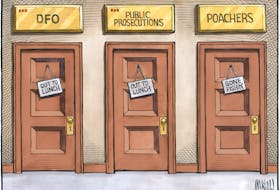A former medical student’s appeal of his conviction for first-degree murder in the slaying of a fellow Dalhousie University student in August 2015 will be heard by the Nova Scotia Court of Appeal in early 2020.
William Michael Sandeson, 26, is serving a life sentence with no eligibility for parole for 25 years.
A Nova Scotia Supreme Court jury deliberated for more than 22 hours over three days in June 2017 before finding Sandeson guilty of murdering Taylor Samson.
Samson, 22, was last seen alive on the night of Aug. 15, 2015, when he went to Sandeson’s apartment on Henry Street in Halifax to sell him nine kilograms of marijuana for $40,000.
A pair of Sandeson’s track teammates who also lived in the building looked inside his apartment after hearing a single gunshot and saw Samson slumped over in a chair at the kitchen table, with blood coming out of his head.
Samson’s body has not been located by police. His DNA was found on a handgun, black duffel bag and other items seized from Sandeson’s apartment or his family’s farm in Lower Truro.
Sandeson had a $200,000 line of credit that was co-signed by his mother to pay for medical school, but more than $70,000 of that money had been spent by August 2015, before he even started classes at medical school.
Prosecutors argued that Sandeson cooked up a plan to kill Samson and steal the marijuana to pay off his debts. At sentencing in July 2017, Justice Josh Arnold said there was no evidence Sandeson had the cash to pay for the drugs.
Neighbours
Sandeson’s neighbours initially told police they hadn’t seen or heard anything that night.
The defence retained Martin & Associates Investigations Inc. in the fall of 2015 to interview witnesses in preparation for criminal proceedings.
The two neighbours revealed what they had actually observed when they were interviewed by Brice Webb, a retired RCMP officer who worked for Tom Martin, a former homicide investigator with Halifax Regional Police.
Webb then shared those discussions with police and urged them to re-interview the witnesses. He also helped police find the men and take new statements.
The defence team did not learn what Webb had done until May 2017, in the middle of the jury trial.
The judge denied a defence application for a mistrial, ruling that Webb’s actions did not breach solicitor-client privilege and caused “insignificant” damage to Sandeson’s right to a fair trial.
Sandeson filed a handwritten notice of appeal the day after his conviction. He cited several grounds for appeal, claiming the verdict was unreasonable, that his solicitor-client privilege was breached when the private investigator tipped off police about the two witnesses, and that police searches of his cellphone and apartment were unconstitutional.
He wants the Appeal Court to set aside his conviction for first-degree murder and order a new trial on the lesser charge of second-degree murder.
Sandeson, who is serving his sentence at a federal penitentiary in Donnacona, Que., recently retained Ian R. Smith of Toronto as his lawyer for the appeal.
During a conference call with lawyers Wednesday, an Appeal Court judge scheduled the appeal hearing for Jan. 20 and 21.
Smith was directed to file an amended notice of appeal on behalf of his client by Sept. 20.
Last August, Sandeson filed a lawsuit against the private investigator and his firm, alleging they breached their fiduciary duty to him and failed to perform their services in a diligent and competent manner.
“The plaintiff states that he would have had a reasonable prospect of success at trial of being acquitted had Webb not conducted himself in the manner described herein,” the statement of claim says.
Sandeson says Webb’s actions prevented him from making a “complete and full defence” in the criminal proceedings.
The lawsuit seeks unspecified general and special damages.
Earlier in 2018, Sandeson successfully sued his former roommate in small claims court for taking part of his sneaker collection and some homemade wine. The adjudicator awarded Sandeson $500 in damages plus $199.45 for costs and process serving.









